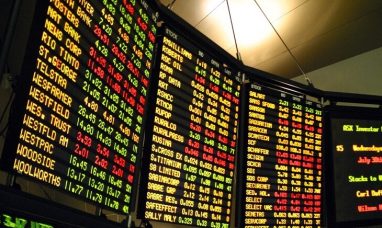U.S. stocks tumbled on Wednesday as a hotter-than-expected inflation report rattled investors, extending the ongoing stock market decline. The S&P 500 fell 0.9% in early trading, the Dow Jones Industrial Average dropped 418 points, and the Nasdaq Composite lost 0.8%. Investors reacted swiftly, selling off equities across sectors from technology to consumer goods.
Treasury Yields Rise as Fed Rate Cut Hopes Fade
The bond market also saw sharp movements, with the yield on the 2-year Treasury rising from 4.28% to 4.37%, while the 10-year Treasury yield jumped from 4.53% to 4.63%. The sell-off reflects growing skepticism that the Federal Reserve will cut interest rates soon. Elevated rates often lead to a prolonged stock market decline, as they make risk-free government bonds more attractive than equities.
Inflation Rises, Pressuring Consumers and Businesses
The latest consumer price index (CPI) data showed a 3% increase in prices from a year ago, up from 2.9% the previous month. The cost of essential goods like groceries, gasoline, and used cars contributed to the inflation spike. Persistent inflation remains a challenge for both consumers and businesses, weighing on corporate earnings and investor sentiment.
Corporate Earnings React to Market Turbulence
Among individual stocks, CVS Health (NYSE:CVS) surged 9.3% after exceeding Wall Street’s sales and profit expectations, despite reporting lower year-over-year earnings. Meanwhile, ride-hailing service Lyft (NASDAQ:LYFT) plummeted 14% in pre-market trading due to weaker-than-expected revenue, although its profits surpassed forecasts.
Food delivery giant DoorDash (NYSE:DASH) gained 4.2% after slightly missing profit estimates but beating revenue expectations. Elsewhere, budget airline Frontier Group Holdings (NASDAQ:ULCC) dropped 4.4% as Spirit Airlines (NYSE:SAVE) rejected its latest takeover bid, choosing instead to focus on emerging from bankruptcy.
Global Markets Show Mixed Reactions
The stock market decline in the U.S. had ripple effects across global markets. Japan’s Nikkei 225 rose 0.4% to 38,963.70, while Australia’s S&P/ASX 200 gained 0.6% to 8,535.30. South Korea’s Kospi climbed 0.4% to 2,548.39. In Europe, Germany’s DAX edged up 0.3%, Britain’s FTSE 100 rose 0.1%, and France’s CAC 40 remained flat.
Energy and Currency Markets Also See Volatility
Oil prices fell amid economic uncertainty, with U.S. benchmark crude declining 81 cents to $72.51 per barrel and Brent crude losing 69 cents to $76.31. In currency markets, the U.S. dollar strengthened against the yen, rising to 153.54 from 152.43, while the euro edged up to $1.0373.
Future Outlook: Will the Market Rebound?
With inflation remaining stubbornly high and interest rate cuts unlikely in the near term, investors should brace for continued volatility. The stock market decline could persist unless new economic data suggests easing inflationary pressures. Analysts will closely monitor corporate earnings and Federal Reserve signals for any signs of market stabilization.
Future Outlook: Will the Market Rebound?
With inflation remaining stubbornly high and interest rate cuts unlikely in the near term, investors should brace for continued volatility. The stock market decline could persist unless new economic data suggests easing inflationary pressures. Analysts will closely monitor corporate earnings and Federal Reserve signals for any signs of market stabilization.
Investor Strategies Amid Market Uncertainty
As Wall Street grapples with inflation concerns and shifting interest rate expectations, investors are looking for ways to navigate the downturn. Some are shifting toward defensive sectors like consumer staples, healthcare, and utilities, which tend to perform better during economic uncertainty. Others are increasing exposure to bonds, as rising yields provide more attractive returns.
Technology stocks, which have driven much of the market’s recent gains, are experiencing a correction. Despite strong earnings from companies like Nvidia (NASDAQ:NVDA), the broader tech sector is feeling pressure from concerns over valuation and rising borrowing costs.
Key Events to Watch
The upcoming Federal Reserve meeting will be crucial in shaping market expectations. Any indication that policymakers may ease their stance on interest rates could provide relief to investors. Additionally, earnings reports from major companies in the coming weeks will offer insights into how businesses are coping with persistent inflation and higher financing costs.
For now, market participants remain cautious, with many waiting for clear signs of economic improvement before making significant investment moves. The stock market decline may not be over, but history suggests that patient investors who stay informed and diversified can weather the storm.
Featured Image – Freepik






